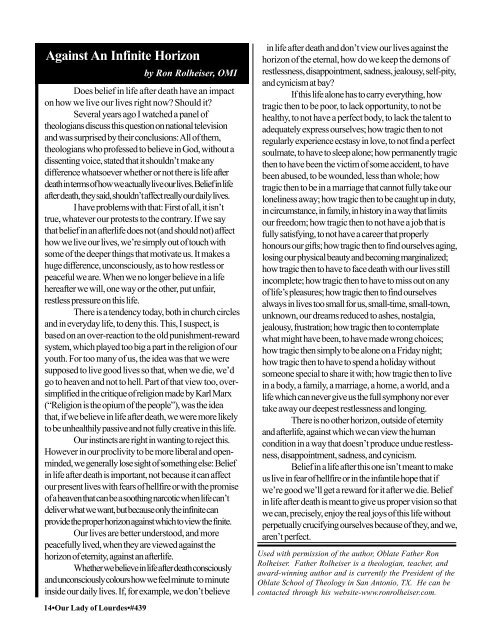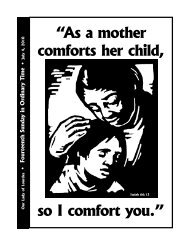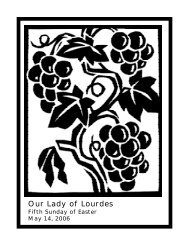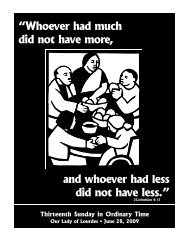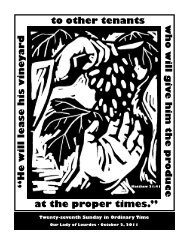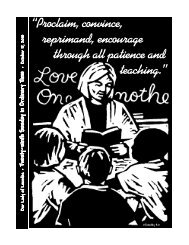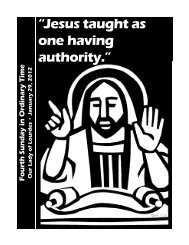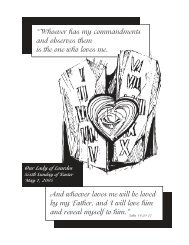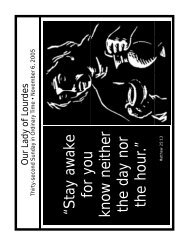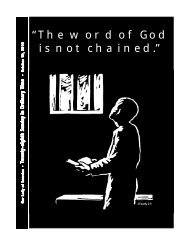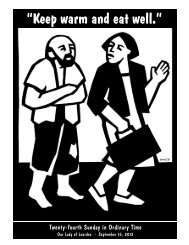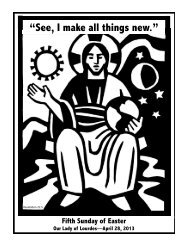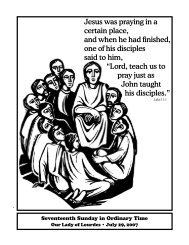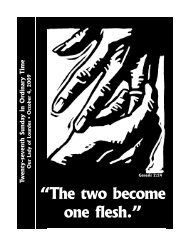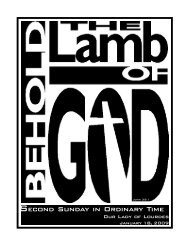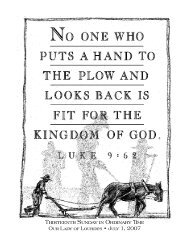#439-OLL-December 30, 2007.p65 - The Parish Family of Our Lady ...
#439-OLL-December 30, 2007.p65 - The Parish Family of Our Lady ...
#439-OLL-December 30, 2007.p65 - The Parish Family of Our Lady ...
Create successful ePaper yourself
Turn your PDF publications into a flip-book with our unique Google optimized e-Paper software.
Against An Infinite Horizon<br />
14•<strong>Our</strong> <strong>Lady</strong> <strong>of</strong> Lourdes•<strong>#439</strong><br />
by Ron Rolheiser, OMI<br />
Does belief in life after death have an impact<br />
on how we live our lives right now? Should it?<br />
Several years ago I watched a panel <strong>of</strong><br />
theologians discuss this question on national television<br />
and was surprised by their conclusions: All <strong>of</strong> them,<br />
theologians who pr<strong>of</strong>essed to believe in God, without a<br />
dissenting voice, stated that it shouldn’t make any<br />
difference whatsoever whether or not there is life after<br />
death in terms <strong>of</strong> how we actually live our lives. Belief in life<br />
after death, they said, shouldn’t affect really our daily lives.<br />
I have problems with that: First <strong>of</strong> all, it isn’t<br />
true, whatever our protests to the contrary. If we say<br />
that belief in an afterlife does not (and should not) affect<br />
how we live our lives, we’re simply out <strong>of</strong> touch with<br />
some <strong>of</strong> the deeper things that motivate us. It makes a<br />
huge difference, unconsciously, as to how restless or<br />
peaceful we are. When we no longer believe in a life<br />
hereafter we will, one way or the other, put unfair,<br />
restless pressure on this life.<br />
<strong>The</strong>re is a tendency today, both in church circles<br />
and in everyday life, to deny this. This, I suspect, is<br />
based on an over-reaction to the old punishment-reward<br />
system, which played too big a part in the religion <strong>of</strong> our<br />
youth. For too many <strong>of</strong> us, the idea was that we were<br />
supposed to live good lives so that, when we die, we’d<br />
go to heaven and not to hell. Part <strong>of</strong> that view too, oversimplified<br />
in the critique <strong>of</strong> religion made by Karl Marx<br />
(“Religion is the opium <strong>of</strong> the people”), was the idea<br />
that, if we believe in life after death, we were more likely<br />
to be unhealthily passive and not fully creative in this life.<br />
<strong>Our</strong> instincts are right in wanting to reject this.<br />
However in our proclivity to be more liberal and openminded,<br />
we generally lose sight <strong>of</strong> something else: Belief<br />
in life after death is important, not because it can affect<br />
our present lives with fears <strong>of</strong> hellfire or with the promise<br />
<strong>of</strong> a heaven that can be a soothing narcotic when life can’t<br />
deliver what we want, but because only the infinite can<br />
provide the proper horizon against which to view the finite.<br />
<strong>Our</strong> lives are better understood, and more<br />
peacefully lived, when they are viewed against the<br />
horizon <strong>of</strong> eternity, against an afterlife.<br />
Whether we believe in life after death consciously<br />
and unconsciously colours how we feel minute to minute<br />
inside our daily lives. If, for example, we don’t believe<br />
in life after death and don’t view our lives against the<br />
horizon <strong>of</strong> the eternal, how do we keep the demons <strong>of</strong><br />
restlessness, disappointment, sadness, jealousy, self-pity,<br />
and cynicism at bay?<br />
If this life alone has to carry everything, how<br />
tragic then to be poor, to lack opportunity, to not be<br />
healthy, to not have a perfect body, to lack the talent to<br />
adequately express ourselves; how tragic then to not<br />
regularly experience ecstasy in love, to not find a perfect<br />
soulmate, to have to sleep alone; how permanently tragic<br />
then to have been the victim <strong>of</strong> some accident, to have<br />
been abused, to be wounded, less than whole; how<br />
tragic then to be in a marriage that cannot fully take our<br />
loneliness away; how tragic then to be caught up in duty,<br />
in circumstance, in family, in history in a way that limits<br />
our freedom; how tragic then to not have a job that is<br />
fully satisfying, to not have a career that properly<br />
honours our gifts; how tragic then to find ourselves aging,<br />
losing our physical beauty and becoming marginalized;<br />
how tragic then to have to face death with our lives still<br />
incomplete; how tragic then to have to miss out on any<br />
<strong>of</strong> life’s pleasures; how tragic then to find ourselves<br />
always in lives too small for us, small-time, small-town,<br />
unknown, our dreams reduced to ashes, nostalgia,<br />
jealousy, frustration; how tragic then to contemplate<br />
what might have been, to have made wrong choices;<br />
how tragic then simply to be alone on a Friday night;<br />
how tragic then to have to spend a holiday without<br />
someone special to share it with; how tragic then to live<br />
in a body, a family, a marriage, a home, a world, and a<br />
life which can never give us the full symphony nor ever<br />
take away our deepest restlessness and longing.<br />
<strong>The</strong>re is no other horizon, outside <strong>of</strong> eternity<br />
and afterlife, against which we can view the human<br />
condition in a way that doesn’t produce undue restlessness,<br />
disappointment, sadness, and cynicism.<br />
Belief in a life after this one isn’t meant to make<br />
us live in fear <strong>of</strong> hellfire or in the infantile hope that if<br />
we’re good we’ll get a reward for it after we die. Belief<br />
in life after death is meant to give us proper vision so that<br />
we can, precisely, enjoy the real joys <strong>of</strong> this life without<br />
perpetually crucifying ourselves because <strong>of</strong> they, and we,<br />
aren’t perfect.<br />
Used with permission <strong>of</strong> the author, Oblate Father Ron<br />
Rolheiser. Father Rolheiser is a theologian, teacher, and<br />
award-winning author and is currently the President <strong>of</strong> the<br />
Oblate School <strong>of</strong> <strong>The</strong>ology in San Antonio, TX. He can be<br />
contacted through his website-www.ronrolheiser.com.


